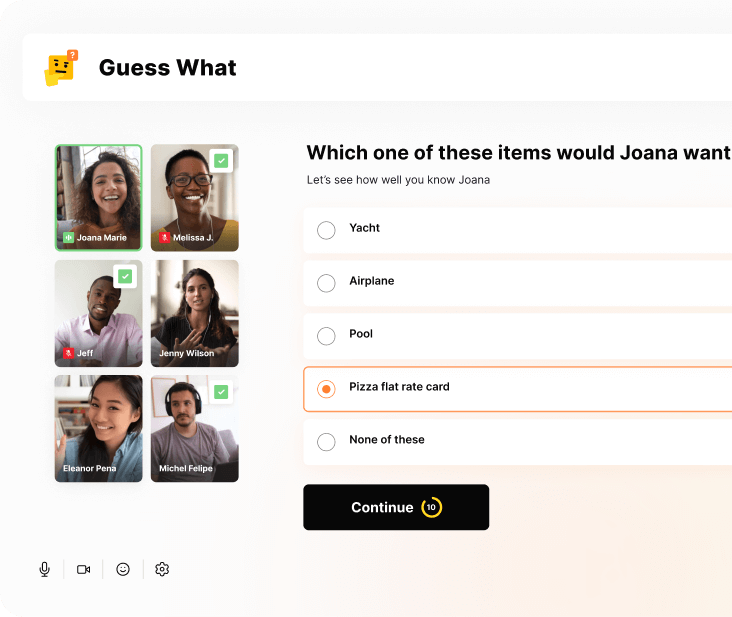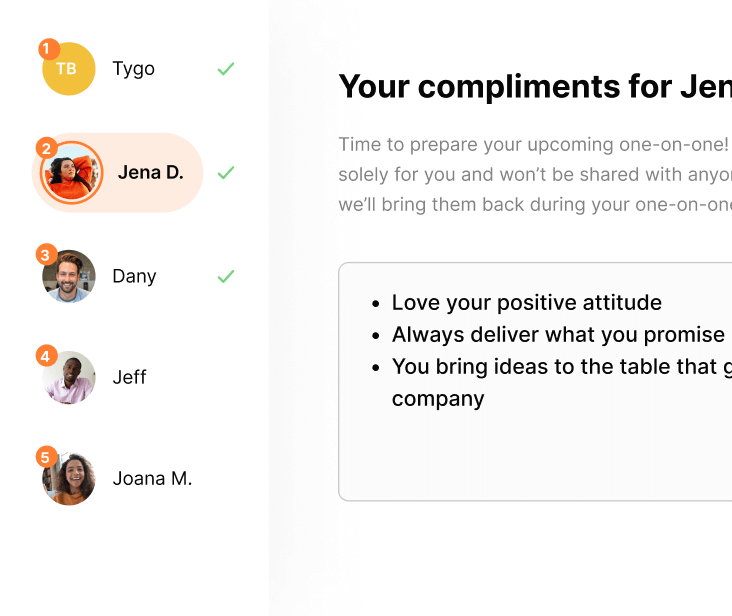Back to Blog
Are employee engagement surveys really anonymous?
As an employer, you want to know what your team thinks about their work environment, management, and other factors that impact performance. But sometimes, no individual employee is ready to speak out.
One way to empower employees is not to make them put their names on this feedback.
But are employee engagement surveys anonymous? The answer is often no, they aren’t always truly anonymous, and answers could be linked back up to a person.
That said, there are ways to create trustworthy surveys anyway.
Are employee satisfaction surveys really anonymous?
A good way to distinguish the results of surveys is by considering whether they’re anonymous or confidential.
- Anonymity means that no one can associate the results with specific individuals.
- Confidentiality means that the surveyer committed to not sharing that result with the person’s name attached. This way, even if the first reader of the results identifies the response, they don’t mention it to anyone.
Choosing to be confidential about survey results is a company commitment. Even if the survey had no space for names, it may still not be anonymous. Some pieces of feedback are from a unique perspective. An observant manager might recognize a person’s tone. They might know that only one person had access to the information shared.
This way, some feedback pieces will remove a person’s anonymity. Promising that survey results cannot be tied to an individual may be overstepping.
Share fun facts and bond with a team quiz
Have your participants choose from a list of questions they’d like their coworkers to answer about them, before watching as they guess the right answer.
01. Yes
share-fun-facts-and-bond-with-a-team-quiz

Run a guided recognition activity
Have your participants choose from a list of questions they’d like their coworkers to answer about them, before watching as they guess the right answer.
01. Yes
run-a-guided-recognition-activity

Organize a virtual cooking class
Hire a professional chef to help your team cook a delicious lunch or dinner. May be difficult for co-workers with families. To find providers and get tips, read our blog about virtual cooking classes.
02. No
organize-a-virtual-cooking-class

Hire a stand-up comedian
Have your participants choose from a list of questions they’d like their coworkers to answer about them, before watching as they guess the right answer.
02. No
hire-a-stand-up-comedian

No items found
No items found
Table of contents
As an employer, you want to know what your team thinks about their work environment, management, and other factors that impact performance. But sometimes, no individual employee is ready to speak out.
One way to empower employees is not to make them put their names on this feedback.
But are employee engagement surveys anonymous? The answer is often no, they aren’t always truly anonymous, and answers could be linked back up to a person.
That said, there are ways to create trustworthy surveys anyway.
Are employee satisfaction surveys really anonymous?
A good way to distinguish the results of surveys is by considering whether they’re anonymous or confidential.
- Anonymity means that no one can associate the results with specific individuals.
- Confidentiality means that the surveyer committed to not sharing that result with the person’s name attached. This way, even if the first reader of the results identifies the response, they don’t mention it to anyone.
Choosing to be confidential about survey results is a company commitment. Even if the survey had no space for names, it may still not be anonymous. Some pieces of feedback are from a unique perspective. An observant manager might recognize a person’s tone. They might know that only one person had access to the information shared.
This way, some feedback pieces will remove a person’s anonymity. Promising that survey results cannot be tied to an individual may be overstepping.
Should an employee engagement survey be anonymous?
Even if it’s hard to guarantee anonymity, there are some benefits to aiming toward confidential, near-anonymous employee satisfaction surveys.
- Employees will often speak up more candidly about criticisms and concerns if they don’t have to tie their name to the complaint.
- Anonymous employee engagement surveys help identify the general engagement environment at work. They are different from offering personalized management and guidance to each employee.
- Short anonymous surveys can offer in-the-moment feedback. They’re useful for getting responses about specific changes and updates at the company. First reactions to new things can be negative, but most employees try to give change a chance, at least outwardly.
How to get anonymous feedback
The key to assessing the state of employee engagement and satisfaction at your company is to select a method of data collection that doesn’t record identifying information.
These tools can help you distribute employee engagement surveys with an anonymous option:
- OfficeVibe allows you to take quick pulse surveys. It makes results easy to read and keeps the surveys short enough for high return rates.
BambooHR offers surveys driven by the Employee Net Promoter Score, a well-researched employee engagement tool. They ensure anonymity to promote more openness. - Google Forms offers a great DIY solution if you want to try surveys before you choose a dedicated survey software. You can leave out any sections that identify your employees if you want to aim for anonymity as much as possible.
How to show employees surveys are trustworthy
1. Share survey results with the team:
Transparency can be a way to show that employers are taking a survey seriously. Management is confident enough to show all the results, even with negative feedback. This allows people to temper feedback and keep it professional since it will be seen widely. Still, this effort doesn’t guarantee anonymity.
2. Initiate change based on specific feedback:
Employees are more likely to be candid if you have a history of responding with changes. Start making changes in response to relevant negative feedback. Let your team know that a specific piece of feedback from the employee satisfaction survey is guiding your choices.
3. Put a clear disclaimer at the top of the survey:
Let your team know what you do with the survey so they understand how confidential you can keep it. Here are some examples of ways you can discuss your surveys:
- “Names and email addresses won’t be recorded with this feedback.”
- “We will look at the data from these surveys as a group, not one at a time.”
- “We are looking for trends in employee engagement, not individual feedback.”
Including survey results in your employee engagement efforts
Once you have anonymous survey results, it’s important to incorporate that feedback into your work. Here are just a few examples of how feedback can be leveraged to improve employee engagement:
- Are employees feeling underappreciated? Consider a virtual platform or engagement app that offers recognition between peers to boost morale.
- Are employees feeling disconnected? Start regularly using team building activities to integrate the team.
- Are employees feeling under-compensated? Benchmark compensation and make sure that you’re offering competitive pay and benefits.
Subscribe to get our latest updates
Subscribe to get our latest updates
.webp)





